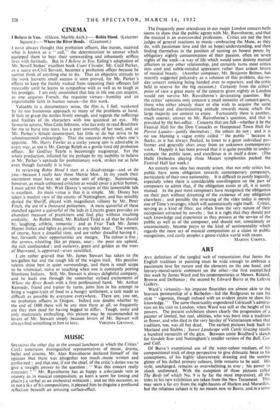MUSIC
SPEAKING the other day at the annual luncheon at which the Critics' Circle entertains distinguished representatives of music, drama, ballet and cinema, Mr. Alan Rawsthorne declared himself of the opinion that there was altogether too much .music written and performed ; and that one, if not the chief, of the critic's duties was to give a straight answer to the question : " Was this concert really necessary ? " Mr. Rawsthorne has as happy a scherzando vein in oratory as in musical composition, as keen a scent for timing and placinl a verbal as an orchestral witticism ; and on this occasion, as in pot a fe.v of his compositions, it pleased him to disguise a profound reflection beneath an amusing surface-effect.
The frequently poor attendance in our major London concert-halls seems to show that the public agrees with Mr. Rawsthorne, and that the musical is an overcrowded profession. Critics are not the best judges of general reactions to music—embracing the Muse, as they do, with passionate love and (let us hope) understanding, and then finding themselves in the position of turning an honest penny by obligatory nightly consummation of their passion, often on seven nights of the week—a way of life which would soon destroy mutual affection in any other relationship, and certainly turns most critics into cool and subtle-minded appraisers rather than ardent lovers of musical beauty. (Another composer, Mr. Benjamin Britten, has
recently suggested polyandry as a solution of this problem, day-to- day concert noticing being handed over to reporters, and the critic held in reserve for the big occasion.) Certainly from the critics' point of view a great many of the concerts given nightly in London would not survive Mr. Rawsthorne's devastating question. But the critics' opinions only concern a small minority of concert-goers, those who either already share or else wish to acquire the same intellectual and discriminating attitude towards music which the large majority are content to enjoy. Fortunately there is another, much coarser, answer to Mr. Rawsthorne's question, and that is provided by the box-office. Concerts that are full—whether it be the Festival Hall for the Don Cossacks or Hampstead Town Hall for Pierrot Lunaire—justify themselves ; the others do not ; and it is no use blaming a vague entity called " the public " because it flocks, as it has always flocked, to listen to a great individual per- former and generally shies away from an unknown contemporary work. Happily it has been proved that it is quite possible to under- estimate the public taste, and excellence is in itself a draw. (The Halle Orchestra playing three Mozart symphonies packed the Festival Hall last week.)
An entirely new idea has recently arisen, that not only critics but public have some obligation towards contemporary composers, particularly of their own nationality. It is difficult to justify logically, especially when there is considerable unwillingness on the part of composers to admit that, if the obligation exists at all, it is surely mutual. In the past most composers have recognised the obligation on their part without dreaming of the existence of any obligation elsewhere ; and possibly the reversing of the roles today is merely one of Time's revenges, which will automatically right itself. Critics, serving as a kind of filter, are often from the very nature of their occupation attracted by novelty ; but it, is right that they should put such knowledge and experience as they possess at the service of the public as well as of the composer, and should not, consciously or unconsciously, become preys to the kind of sentimentality which regards the mere act of musical composition as a claim to public recognition, and easily peoples a goose-ridden world with swans.
MARTIN COOPER.










































 Previous page
Previous page